- Home
- Donald Hamilton
The Threateners Page 5
The Threateners Read online
Page 5
I said, “You’re making me feel bad. I was trying to brain her. You mean I failed?”
“Don’t be so tough. And you didn’t have to hit her all that hard!”
I looked at her in amazement. “The dame was waving a gun, baby! If she’s breathing at all, she’s way ahead of the game; she should be dead.”
Madeleine started to speak hotly; then she threw back her head and laughed instead. “Sorry, Matt, I’ve just been living too long with respectable people in that beautiful dreamland they inhabit where violence is unspeakable and death is unthinkable and if you have a problem you just call a policeman and he’ll come right over and fix it for you. Wish-fulfillment country. Thanks for kicking me back into the crude real world again; it’s like coming home.” She looked down at the woman on the ground. “So what do we do with this, cut its throat?”
Something was nudging my thigh. I said, “Happy, stop it, I can’t play with you now.”
“He wants to give you something,” Madeleine said. “It looks like a purse.”
Getting no cooperation from me, he’d found a retrieving object on his own; and he was holding it in his mouth, sitting properly to deliver it with his tail working happily. I told him what a great dog he was and took the rather shabby brown leather bag. It was of good quality, I noted, just well-worn; perhaps a favorite best purse relegated, after many years of faithful dress-up service, to informal occasions when the owner was wearing jeans and shooting people. Happy had left a little saliva on it, but no tooth marks. Like I said, softmouthed. I wiped it off and opened it. A small wallet inside, also pretty good leather, yielded up several credit cards and a driver’s license in the name of Ruth Stephanie Steiner, 22 Butterwood Road, Santa Fe, New Mexico 87501.
For a moment the name meant nothing to me; then I put the stuff into the hands of Madeleine, who’d come over to look, and knelt beside the unconscious woman, turning her over carefully so I could see her face. I hadn’t really got a good look at her during the action. Pale and dirt-streaked, her features didn’t look very familiar; the girl I was thinking of had been very different in appearance, a grave young woman with big blue eyes hiding behind big horn-rimmed glasses, and a ragged mop of short blond hair. I spoke a rude word as I got to my feet, realizing belatedly that I was wearing only shoes and underwear shorts, and a number of rosebush scratches. I listened for a moment, but the lone shot seemed to have aroused no neighborhood interest. I noted that the woman hadn’t got the gate completely closed after slipping into the yard. I closed and padlocked it, reminding myself not to leave it unlocked again, since there seemed to be no telling what might come through it.
“Keep an eye on the dame, I’ve got to get to the phone,” I said.
“You know who she is.” It was a statement, not a question.
“Yes,” I said. “I’ll tell you later. Hold the fort.”
Although I’d called the number a couple of times in the past few months, I didn’t have it in my head or written down; I had to dig it out of the book. A young-girl voice answered on the fourth ring. I asked the kid to call her daddy.
“Popsy, it’s for you,” I heard her shout.
Footsteps approached the phone. I heard a male voice say distantly, “Your mama does not like you to call me Popsy, Andrea. Show a little respect, huh, small one?”
“Yes, Papa.”
Then the voice was speaking directly into the phone: “Steiner here.”
I said, “Mark, this is Matt. I’ve got something of yours. A Llama pistol, the small-frame model, caliber three-eighty, one shot fired. It didn’t go off of its own accord. I think she was shooting at Happy but she missed.”
“Oh shit!” There was a pause; then Mark spoke carefully: “Ruth has been terrified of dogs ever since the time they tried to run her down with hounds when she escaped from . . . Never mind. I was not even aware that she had gone out; I thought she was taking a nap. Is she okay?”
No, I had to thump her pretty hard, disarming her. Do you want me to call nine-one-one for an ambulance? ”
“Damn it, amigo, you did not have to . . . !”
I said irritably, “Amigo, it’s only my gentle nature that kept me from putting a load of number-four buck into the trigger-happy broad. Now, having softheartedly spared her life, I’m giving you and her another break, calling you instead of the cops. Be grateful. What about that ambulance?”
After a moment he asked, “What is the police situation?”
“I haven’t called them, and I don’t think anybody’s reported the shot. That nine-millimeter Kurz isn’t a very loud cartridge, and the Hispanic kids in the neighborhood don’t wait for the Fourth of July to set off firecrackers; there’s always something popping around here.”
At the other end of the line, Mark Steiner cleared his throat. “Please call nobody, I will take care of it. What is the address?” I remembered that I’d been to his house, but he’d never been to mine. When I’d told him how to get there, Mark said, “Wait forme; I will be right over. . . . Matt.”
“Yes.”
“I will contact some people I know. I must come clear across town; they may arrive before I do. Let them in. They will take care of her."
I said, “There have been some funny things going on around here lately. You’d better give them a word so I’ll know they belong to you.”
“Do we need this TV melodrama?”
I said, “As far as I’m concerned we’ve already got it. A strange dame trying to shoot my dog and me for motives unknown seems melodramatic as hell to me.”
“Very well. The password is . . . How about Lapis?”
He pronounced it Lahpis, as Mac had done. I kept my voice even, I hoped, and said, “Like in Lazuli? Good enough.”
"I will be on my way as soon as I make the one telephone call. . . . Oh, and thanks.”
“I’ll tell you later if you’re welcome. ”
I hung up, selected the male garments from the jumble of clothes on the floor—witnesses to the sudden passion that now seemed to belong to the distant past—and pulled them on, trying not to think about the word Mark Steiner had given me because I had absolutely no relevant data to plug into the mental computer. Except that a hung-over young bureaucratic type, talking to Mac, had once let slip the same word in connection with secret government operations in the southwest. Lapis. Latin for “rock,” or “stone.” To hell with it.
I called Washington hurriedly and left word that interesting things were happening here and I’d report in detail within the hour; if I didn’t, an investigation would be in order. After getting the shell out of the chamber and back into the magazine, I hung the shotgun back on the living-room rack, equipped myself with other arms more suitable for the occasion including the Llama, grabbed a spare blanket from the closet, and went back out into the yard. Madeleine was sitting on the edge of the garbage box. She was scratching Happy’s ears with one hand and holding her Colt revolver in the other.
“How’s she doing?” I asked.
Madeleine shrugged. “Still breathing. Should we carry her inside?”
"I think you’re not supposed to move them unnecessarily. It isn’t raining and it isn’t cold. Somebody’s coming for her.” I hesitated. “You wanted to know who she is. She’s the wife of a guy named Mark Steiner. I shoot targets with him occasionally. Don’t ask me what she’s doing here because I don’t know.” I gestured toward the borrowed robe. “You’d better get some clothes on before we have company.”
“Well, I’m not getting back into my lawyer suit; I just put that on to impress you. Get my suitcase out of the Mercedes, will you? The keys are in my purse, somewhere in that love nest of yours. . . .”
“You might have told me you wanted stuff from your car before I locked the gate.”
But it was a comfortable kind of bickering, and I realized that I liked having her around—and at least this one wasn’t likely to be turned off by my violent profession at this late date; she’d known me too long. While she was dressing i
n the house I covered Ruth Steiner with the blanket and, kneeling beside her, pulled back her eyelids the way I’d seen it done. Her pupils were the same size, which could indicate that her cranium wasn’t too badly damaged. Her left ear was split near the top, swollen and bloody, and the growing lump on the side of her head was already spectacular. Still kneeling beside her, I knew, by the change in her breathing, when she started to become aware of her surroundings.
I said, “It’s all right, Mrs. Steiner. Mark’s coming.”
She turned her head painfully to look at me. “What happened . . . ? Oh, take him away!” She was staring past me fearfully.
I said, “He’s a very gentle dog and he’s never bitten anybody in his life, but if he bothers you, I’ll put him inside. . . . Come on, Happy.”
I rose and went over to open the front door and let him in; when I returned, Ruth Steiner was sitting up, pressing both hands to the left side of her head.
“Gentle!” She was rocking back and forth with the pain, and her voice was angry. “Gentle? You should have seen him; he leaped right for my throat; if I hadn’t shoved my purse between his jaws, I’d be dead now!”
I laughed. “Lady, you had a pistol in one hand and an interesting object in the other, didn’t you? Happy thought you were going to fire the gun and toss something for him to fetch, just as I do when I’m training him. I use a blank pistol and a training dummy, but you can’t expect him to tell the difference. Well, you fired the gun, but you were a litde slow with the throw, so he got impatient and jumped for what you were teasing him with, he thought. He had no interest in your throat; all he wanted was your purse.” I looked down at her grimly. “And just for future reference, Mrs. Steiner, if you ever take another shot at my dog, hit or miss, I’ll use the other end of my shotgun on you.”
“Well, that figures!” she said sharply. “I can well believe you’d consider a dog more valuable than a human being, considering how you and your friends behave toward human beings!”
I looked at her for a moment. “What friends?”
“You know what friends! There’s one sitting up the street from our house right now, if he hasn’t followed me here. Oh, damn you, damn you, damn all of you, why can’t you leave us alone? Hounding us, hounding us, finally making us live in this ghastly desert where the wind never stops blowing and there’s always dust in your teeth. . . . Well, maybe we can go back to civilization now that you’ve found us again! Obviously we’re no safer from you hiding under a phony name in our miserable little development shack in this primitive mud-brick town."
I said, “You’ve lost me, Mrs. Steiner. I don’t know where you came from or why you had to leave there; and if any friends of mine are parked near your place here in Santa Fe, they haven’t told me about it.”
She laughed angrily and winced at the pain in her head. “That’s what you would say, isn’t it? But did you really think Mark was fooled when you went out of your way to strike up an acquaintance with him at the gun club last summer and then acted so very helpless with that new rifle that he was obliged to invite you home and fix it for you? You’re not much of an actor, you know; and when Mark realized he was being followed again, it became obvious that you had to be part of the conspiracy, the inside man, I suppose you’d call yourself. . . . What are you laughing at?”
“Never mind,” I said.
I’d laughed, of course, because Mark Steiner’s suspicions of me echoed so faithfully mine of him. And then, of course, there was Madeleine and her suspicions. If the Spookies, whoever they might be, had been trying to turn us all against each other, they’d succeeded brilliantly. Hearing a car pull up outside, I took out the little Llama pistol, it being SOP that you never shoot anybody with your own gun if somebody else’s is available and will do the job. I had no doubt the Llama would do the job. Whatever Mark Steiner might be, he wouldn’t have a gun around the house that wasn’t sighted in properly. Somebody tried the gate and then pounded on it. I walked over there and paused before reaching for the padlock key.
“Give me a word,” I said.
An impatient male voice said, “Lapis, damn you. Now open up.”
I was interested to note that this one called it Laypis.
Chapter 6
The first man who entered my little front yard was tallish and blondish, wearing expensive prefaded jeans, a short, prefaded, denim jacket, and a dark blue turtleneck, all very casual, but I got the impression it was merely a costume he put on for slumming out here in the crude southwest; he was an eastern three-piece-suit man at heart. It showed in the neatly pressed jeans—no true westerner ever put iron to denim—and in the white, capped, well-brushed teeth, the crisp, closely trimmed, slightly wavy, light hair, and the shining, newly shaved face.
On the other hand, he had said Laypis, which placed his origins somewhere west of lah-di-dah Boston. A man of contradictions, obviously. He smelled pretty. If I were to shoot him, at any reasonable range, it would be an easy retrieve for Happy, I reflected, since if I could detect the after-shave lotion and cologne at ten feet, my dog, with his far superior olfactory apparatus, should have no trouble tracking it out to at least a hundred yards even if I dropped the guy in heavy cover.
Our visitor was wearing a gun high on his right hip under the unzipped zipper jacket: a flat automatic, probably chambered for the 9mm Parabellum cartridge that seems to be replacing the good old .38 Special in the affections of the bureaucracy.
“Where is she?” he snapped.
“Right over there, ” I said, inclining my head toward the woman sitting on the ground, watching.
The newcomer looked that way and back to me with suspicion in his baby-blue eyes. He was quite a handsome fellow; the clean-cut, freckled, all-American-college-boy type that some government departments seem to cherish. Somehow, I’d been quite sure from the instant I first sighted him that like me, he got his orders from Washington. As they say, it takes one to know one.
"Steiner says your name is Helm?" He made it a question.
“That’s right. Who are you?”
He flipped a fancy ID folder at me, too fast for me to read what was engraved on the gold shield inside.
“U.S. government,” he said. “We were informed that it was an emergency; that the woman was badly hurt, unconscious, an ambulance case. She doesn’t look like an emergency to me. If this is some kind of a trick . . . Check her out, Mike.”
The second man in was shorter and darker than the first, and his black hair was somewhat longer. He wore a light sport coat instead of a windbreaker, but a slight hip bulge indicated that the gun was in the same place and probably of the same configuration and caliber. They do like to standardize. He walked over and squatted on his heels beside Steiner’s wife. It’s a position that doesn’t come naturally to many Anglos, although I’ve known some cowboys who could make it look comfortable—when I try it, I don’t last very long—but people of Spanish descent seem to be able to sit that way by the hour. He examined her bruised head gently.
His partner spoke to me: “I’ll take the gun.”
I looked at the well-manicured hand he held out for it. There was really no reason why I shouldn’t give him Ruth Steiner’s gun. But then again, there was really no good reason why I should. I get very tired of these officious jerks with badges who march onto the premises and lay claim to every firearm in sight. The weapon goes for around three hundred bucks, retail. He was probably under the mistaken impression that it was my property; but in any case he knew damned well it wasn’t his. I should make him, or the U.S. government, three hundred bucks richer without even a please?
I said, “That’s a pretty reckless statement, isn’t it? The piece is in my hand and yours is in your holster. How are you planning to work this confiscation?” He stared at me, shocked. Representing the U.S. government as he did, he hadn’t expected a refusal. I went on: “You came for a dame, mister; just take her and blow.”
"Listen, you . . . !” Then he stopped, looking past me.
Madeleine’s voice spoke behind me: “Visitors, Matt?”
I answered without turning my head: “The federales, ma’am. They’ve supposedly come for Mrs. Steiner, but this one seems eager to cart away everything that isn’t tied down. He’s starting with the firearms, but he’ll undoubtedly go for the patio furniture next, after which it’s good-bye to the stove, sink, refrigerator, and TV. We call him El Hombre sin Nombre, since he’s very shy about revealing his name, assuming that he has one. That one over there is less anonymous; he’s called Mike. See if he needs help with Mrs. Steiner, will you, please?”
The man in front of me didn’t like it. In feet he was pale enough with anger that the boyish freckles stood out very clearly. However, he couldn’t think of a move to make that might not earn him a bullet. He tried to convince himself that I couldn’t possibly shoot a fine government employee like him, and failed.
Madeleine came into my field of vision, dressed in jeans and a man’s shirt, white, with the tails hanging out. I won’t say she looked as good in those sloppy garments as she had in her smart legal costume—I like dressed-up ladies—but for a denim girl she didn’t do at all badly. On her feet, Reeboks or Adidas or whatever; I can’t keep track of them all. Life was simpler back in the Keds era. She was carrying, incongruously, the smart black purse that went with her business clothes. As I say, dressed up or dressed down, she was still very pleasant to look at. The man called Mike regarded her with frank Latin admiration.
After a moment he cleared his throat and said, “If you can give me a hand, we’ll get her to the car, Miss. . . .” Madeleine took her hand out of her purse, which didn’t leave the purse empty. What had started as a peaceful Sunday, with just a few target .22s popping for fan, seemed to be getting pretty heavy with serious firearms.
“Rustin,” Madeleine said. “Madeleine Rustin. Are you a doctor?”
“Miguel Ortiz at your service, Miss Rustin. No, I’m not a doctor; but they’ve got me kind of specializing in making temporary repairs until the real doctors can take over.”

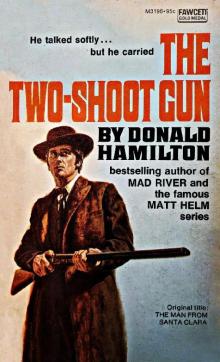 The Two-Shoot Gun
The Two-Shoot Gun Mad River
Mad River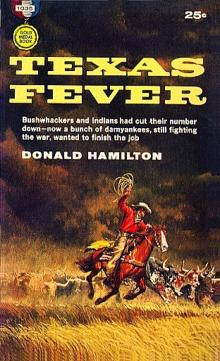 Texas Fever
Texas Fever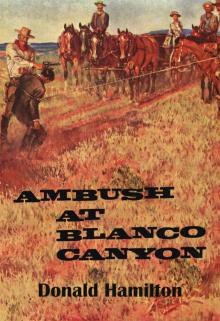 Ambush at Blanco Canyon
Ambush at Blanco Canyon The Big Country
The Big Country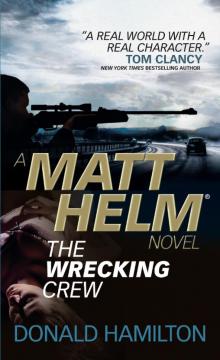 The Wrecking Crew
The Wrecking Crew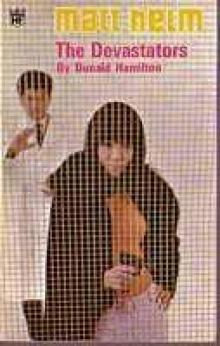 The Devastators mh-9
The Devastators mh-9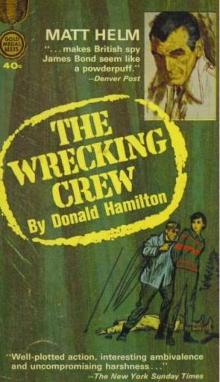 The Wrecking Crew mh-2
The Wrecking Crew mh-2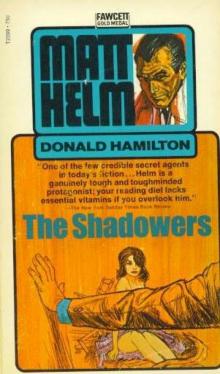 The Shadowers mh-7
The Shadowers mh-7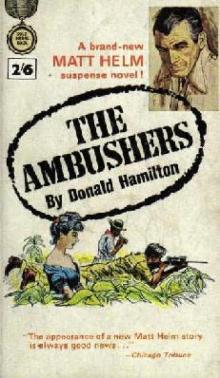 The Ambushers mh-6
The Ambushers mh-6 The Betrayers
The Betrayers The Terrorizers
The Terrorizers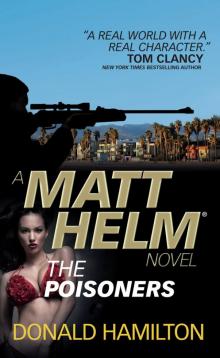 The Poisoners
The Poisoners The Devastators
The Devastators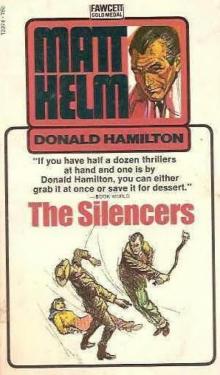 The Silencers mh-5
The Silencers mh-5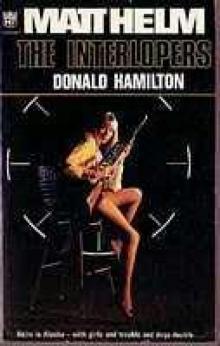 The Interlopers mh-12
The Interlopers mh-12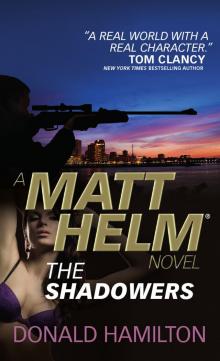 The Shadowers
The Shadowers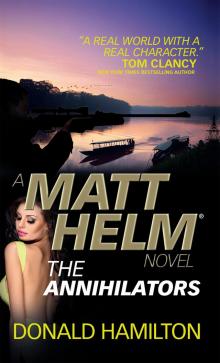 The Annihilators
The Annihilators The Vanishers
The Vanishers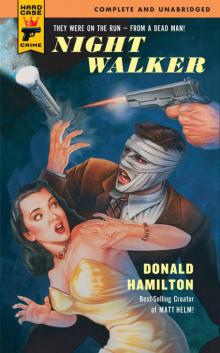 Night Walker
Night Walker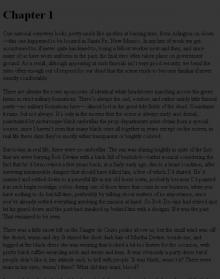 The Revengers
The Revengers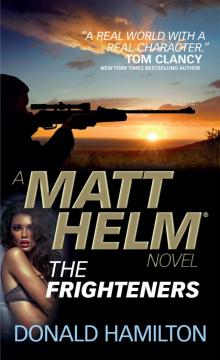 The Frighteners
The Frighteners The Infiltrators
The Infiltrators The Intriguers mh-14
The Intriguers mh-14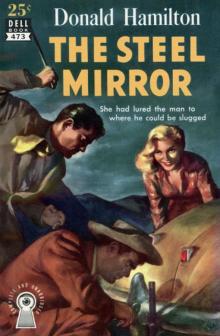 The Steel Mirror
The Steel Mirror The Menacers
The Menacers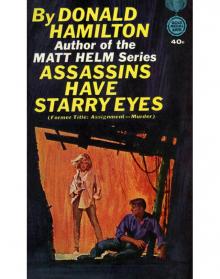 Assassins Have Starry Eyes
Assassins Have Starry Eyes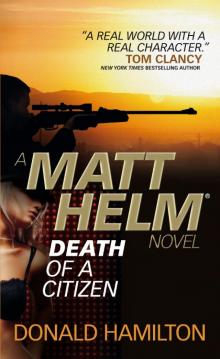 Death of a Citizen
Death of a Citizen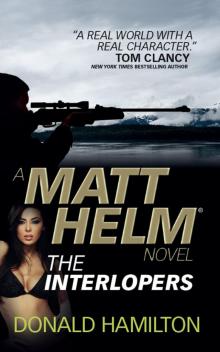 Matt Helm--The Interlopers
Matt Helm--The Interlopers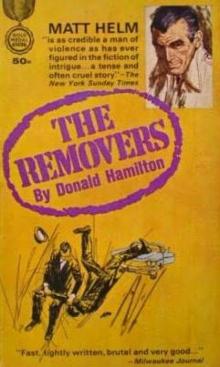 The Removers mh-3
The Removers mh-3 The Demolishers
The Demolishers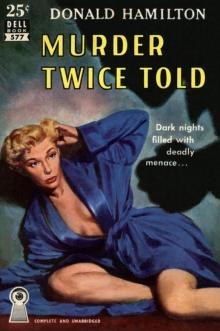 Murder Twice Told
Murder Twice Told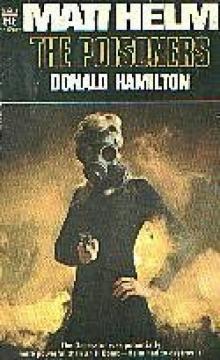 The Poisoners mh-13
The Poisoners mh-13 The Ambushers
The Ambushers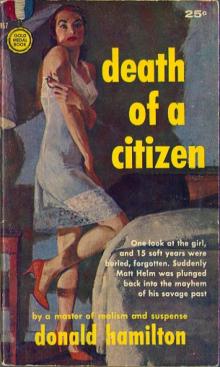 Death of a Citizen mh-1
Death of a Citizen mh-1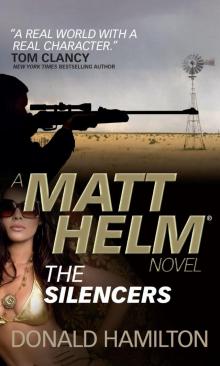 The Silencers
The Silencers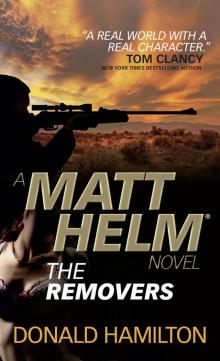 The Removers
The Removers The Intimidators
The Intimidators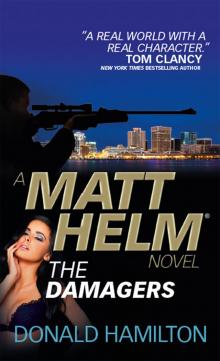 The Damagers
The Damagers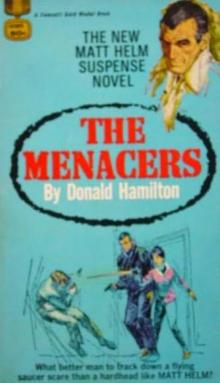 The Menacers mh-11
The Menacers mh-11 The Retaliators
The Retaliators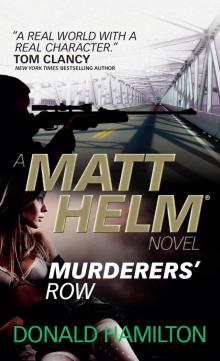 Murderers' Row
Murderers' Row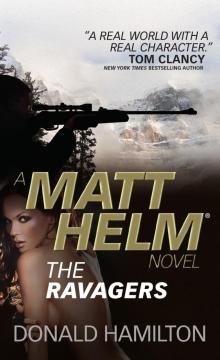 The Ravagers
The Ravagers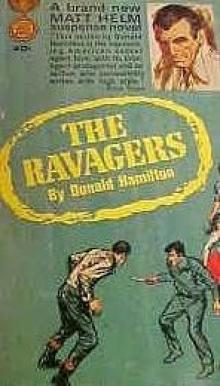 The Ravagers mh-8
The Ravagers mh-8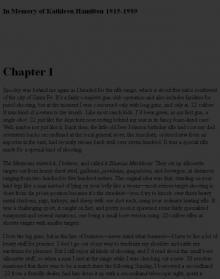 The Threateners
The Threateners The Betrayers mh-10
The Betrayers mh-10